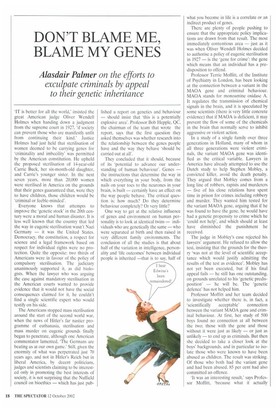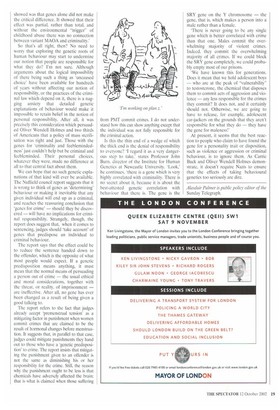DON'T BLAME ME, BLAME MY GENES
Alasdair Palmer on the efforts to
exculpate criminals by appeal to their genetic inheritance
'IT is better for all the world,' insisted the great American judge Oliver Wendell Holmes when handing down a judgment from the supreme court in 1927, 'if society can prevent those who are manifestly unfit from continuing their kind.' Justice Holmes had just held that sterilisation of women deemed to be carrying genes for 'criminality and imbecility' was permitted by the American constitution. He upheld the proposed sterilisation of 14-year-old Carrie Buck, her six-month-old daughter, and Carrie's younger sister. In the next seven years, more than 20,000 women were sterilised in America on the grounds that their genes guaranteed that, were they to have children, those children would be 'criminal or feeble-minded'.
Everyone knows that attempts to improve the 'genetic stock' in the 20th century were a moral and human disaster. It is less well known that the country that led the way in eugenic sterilisation wasn't Nazi Germany — it was the United States. Democracy, the constitution, a respect for science and a legal framework based on respect for individual rights were no protection. Quite the opposite: two thirds of Americans were in favour of the policy of compulsory sterilisation. The judiciary unanimously supported it, as did biologists. When the lawyer who was arguing the case against mandatory sterilisation in the American courts wanted to provide evidence that it would not have the social consequences claimed for it, he couldn't find a single scientific expert who would testify on his side.
The Americans stopped mass sterilisation around the start of the second world war, when the news of Hitler's far nastier programme of euthanasia, sterilisation and mass murder on eugenic grounds finally began to penetrate, although one American commentator lamented, 'The Germans are beating us at our own game.' Still, given the enormity of what was perpetrated just 70 years ago, and not in Hitler's Reich but in liberal America, by decent politicians, judges and scientists claiming to be interested only in promoting the best interests of society, it is not surprising that the Nuffield council on bioethics — which has just pub lished a report on genetics and behaviour — should insist that 'this is a potentially explosive area'. Professor Bob Hepple, QC, the chairman of the team that wrote the report, says that the first question they asked themselves was whether research into the relationship between the genes people have and the way they behave 'should be carried out at all'.
They concluded that it should, because of its 'potential to advance our understanding of human behaviour'. Genes — the instructions that determine the way in which everything in your body, from the nails on your toes to the neurones in your brain, is built — certainly have an effect on the way people behave. The critical question is: how much? Do they determine behaviour completely? Or very little?
One way to get at the relative influence of genes and environment on human personality is to look at identical twins — individuals who are genetically the same — who were separated at birth and then raised in very different family environments. The conclusion of all the studies is that about half of the variation in intelligence, personality and 'life outcomes' between individual people is inherited —that is to say, half of what you become in life is a correlate or an indirect product of genes.
There are plenty of people pushing to ensure that the appropriate policy implications are drawn from that result. The most immediately contentious area — just as it was when Oliver Wendell Holmes decided to authorise a policy of eugenic sterilisation in 1927 — is the 'gene for crime': the gene which means that an individual has a predisposition to offend.
Professor Terrie Moffitt, of the Institute of Psychiatry in London, has been looking at the connection between a variant in the MAOA gene and criminal behaviour. MAOA stands for monoamine oxidase A. It regulates the transmission of chemical signals in the brain, and it is speculated by some scientists (there is very little concrete evidence) that if MAOA is deficient, it may prevent the flow of some of the chemicals in the brain that normally serve to inhibit aggressive or violent action.
In a study of a single family over three generations in Holland, many of whom in all three generations were violent criminals, the variant MAOA gene was identified as the critical variable. Lawyers in America have already attempted to use the Dutch study to help Stephen Mobley, a convicted killer, avoid the death penalty. They argued that Mobley comes from a long line of robbers, rapists and murderers — five of his close relations have spent time in prison for crimes including robbery and murder. They wanted him tested for the variant MAOA gene, arguing that if he was found to have the gene, he would have had a genetic propensity to crime which he 'could not help', and which should at least have diminished the punishment he received.
The judge in Mobley's case rejected his lawyers' argument. He refused to allow the test, insisting that the grounds for the theory 'was not at the level of scientific acceptance which would justify admitting the results of the test as evidence'. Mobley has not yet been executed, but if his final appeal fails — he still has one outstanding, on grounds unrelated to his 'genetic predisposition' — he will be. The 'genetic defence' has not helped him.
Professor Moffitt and her team decided to investigate whether there is, in fact, a 'scientifically acceptable' connection between the variant MAOA gene and criminal behaviour. At first, her study of 500 boys found no connection at all between the two; those with the gene and those without it were just as likely — or just as unlikely — to end up as criminals. But then she decided to take a closer look at the boys' backgrounds, and in particular to isolate those who were known to have been abused as children. The result was striking. Of those who both had the variant gene and had been abused, 85 per cent had also committed an offence.
'It was an interesting result,' says Professor Moffitt, 'because what it actually showed was that genes alone did not make the critical difference. It showed that their effect was partial, rather than total, and without the environmental "trigger" of childhood abuse there was no connection between variant MAOA and criminality.'
So that's all right, then? No need to worry that exploring the genetic roots of human behaviour may start to undermine our notion that people are responsible for what they do? I'm not sure. Although arguments about the logical impossibility of there being such a thing as 'uncaused choice' have been available for hundreds of years without affecting our notion of responsibility, or the practices of the criminal law which depend on it, there is a nagging anxiety that detailed genetic explanations of behaviour would make it impossible to retain belief in the notion of personal responsibility. After all, it was precisely this consideration which persuaded Oliver Wendell Holmes and two thirds of Americans that a policy of mass sterilisation was right and just. Those with the genes for 'criminality and feeblemindedness' just couldn't help but be criminal and feebleminded. Their personal choices, whatever they were, made no difference at all to that central fact about them.
We can hope that no such genetic explanations of that kind will ever be available. The Nuffield council report suggests that it is wrong to think of genes as 'determining' behaviour or making it inevitable that any given individual will end up as a criminal, and reaches the reassuring conclusion that 'genes for crime' — should they be discovered — will have no implications for criminal responsibility. Strangely, though, the report does suggest that, when it comes to sentencing, judges should 'take account' of genes that predispose an individual to criminal behaviour.
The report says that the effect could be to reduce the sentence handed down to the offender, which is the opposite of what most people would expect. If a genetic predisposition means anything, it must mean that the normal means of persuading a person out of crime — the usual ethical and moral considerations, together with the threat, or reality, of imprisonment — are ineffective, After all, no gene has ever been changed as a result of being given a good talking to.
The report refers to the fact that judges already accept 'premenstrual tension' as a mitigating factor in punishment when women commit crimes that are claimed to be the result of hormonal changes before menstruation. It suggests that, in parallel to that case, judges could mitigate punishments they hand out to those who have a 'genetic predisposition' to crime. The report insists that mitigating the punishment given to an offender is not the same as diminishing his or her responsibility for the crime. Still, the reason why the punishment ought to be less is that chemicals have adversely affected the brain; that is what is claimed when those suffering from PMT commit crimes. I do not understand how this can show anything except that the individual was not fully responsible for the criminal action.
Is this the thin end of a wedge of which the thick end is the denial of responsibility to everyone? 'I regard it as a very dangerous step to take,' states Professor John Burn, director of the Institute for Human Genetics at Newcastle University. 'Look,' he continues, 'there is a gene which is very highly correlated with criminality. There is no secret about it, because it is about the best-attested genetic correlation with behaviour that there is. The gene is the SRY gene on the Y chromosome — the gene, that is, which makes a person into a male rather than a female, 'There is never going to be any single gene which is better correlated with crime than that one. Males commit the overwhelming majority of violent crimes. Indeed, they commit the overwhelming majority of all crimes. If we could block the SRY gene completely, we could probably empty most of our prisons.
'We have known this for generations. Does it mean that we hold adolescent boys — who are at the peak of "vulnerability" to testosterone, the chemical that disposes them to commit acts of aggression and violence — any less responsible for the crimes they commit? It does not, and it certainly should not, Otherwise, we are going to have to release, for example, adolescent car-jackers on the grounds that they aren't responsible for what they do they have the gene for maleness!'
At present, it seems that the best reaction to people who claim to have found the gene for a personality trait or disposition, such as violence or aggression or criminal behaviour, is to ignore them. As Carrie Buck and Oliver Wendell Holmes demonstrate, it doesn't require Nazis to ensure that the effects of taking behavioural genetics too seriously are dire.
Alasdair Palmer is public policy editor of the Sunday Telegraph.



































































































 Previous page
Previous page